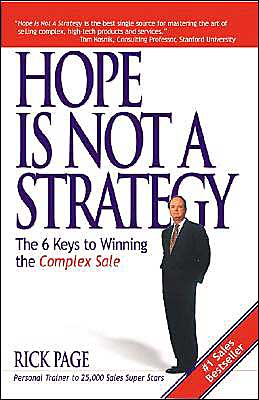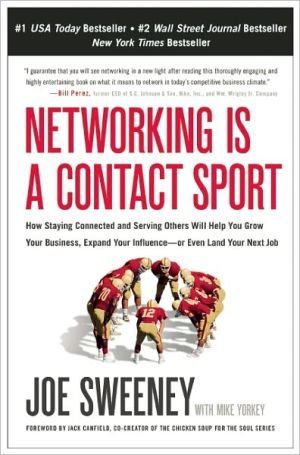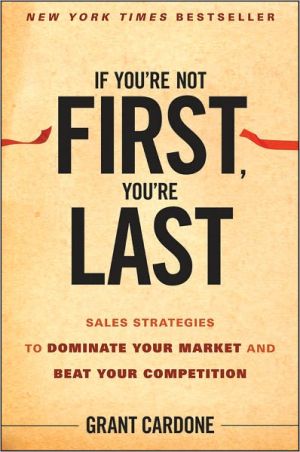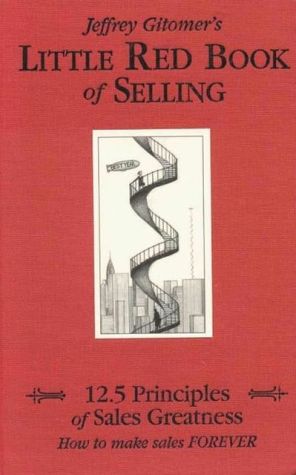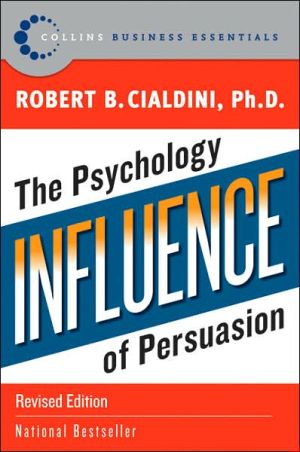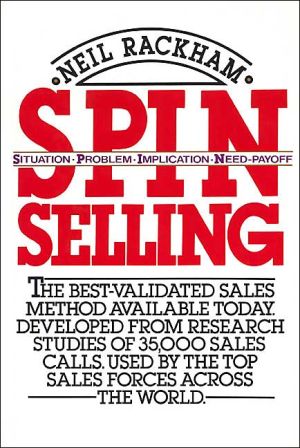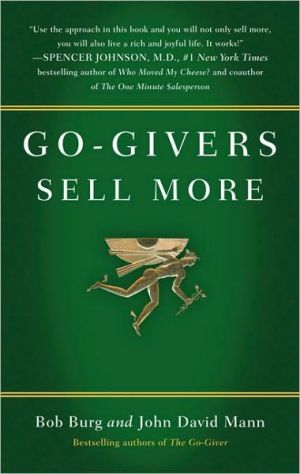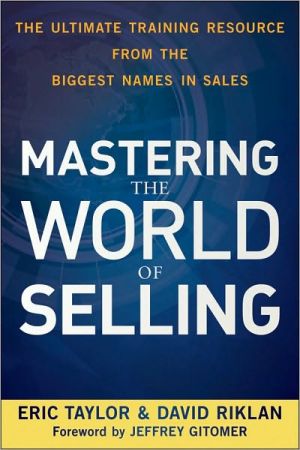Hope Is Not a Strategy: The 6 Keys to Winning the Complex Sale
"No longer is being 'a good closer' the basis of sustainable success. Instead intakes the kind of strategic thinking Rick Page outlines inHope Is Not a Strategy."—Geoffrey Moore, author of Crossing the Chasm and Inside the Tornado\ Master of the complex sale, Rick Page is the author of the bestselling book, Hope Is Not a Strategy, and one of the most sought-after sales consultants and trainers in the world.\ He has taught his breakthrough selling strategies to thousands of people in 150...
Search in google:
Put your team on top with winning B2B sales strategies and techniques"No longer is being 'a closer" the basis of sustainable success. Instead it takes the kind of strategic thinking Rick Page outlines in Hope Is Not a Strategy."—Geoffrey Moore, author of Crossing the Chasm and Inside the TornadoHow do leading world-class sales and consulting organizations consistently land the big clients and the huge contracts, even in the fast-changing, risk-laden new economy? The world's leading authority on B2B team selling is about to show you. In his runaway bestselling guide to sales excellence, Rick Page reveals the breakthrough selling strategies that have made superstars of thousands of his students.Combining a commonsense approach with the best kept secrets of the world's most successful sales people, this book presents a proven, six-step process for winning sales opportunities and shows you how to: Sell to a prospect's strategic business "pain" for greater value Qualify the prospect for forecasting accuracy Differentiate your solution to build competitive preference Link your strategy to the prospect's decision-making process Sell to power by finding the key to buyer politics Communicate your strategy throughout your team Rick Page founded The Complex Sale, an Atlanta-based company that provides sales consulting and training worldwide.
Hope Is Not A Strategy\ The 6 Keys to Winning the Complex Sale \ \ By Rick Page \ McGraw-Hill, Inc.\ Copyright © 2002 Rick Page\ All right reserved.\ ISBN: 978-0-07-141871-3 \ \ \ Chapter One\ Out of Control \ Things were going fine in this sale at the beginning but now you feel something's not right. The prospect didn't call back for three days and then suddenly came up with a new requirement—one you can't meet. There's a new person on the evaluation committee you don't know. And you've just discovered that of the two people on the committee who seemed to like you, one is helping the competition and the other is not respected within the company.\ The capabilities presentation was uncoordinated and unfocused, and you spent too much time on the wrong topics. Countless hours have been spent coming up with a proposal and the executives are still not accessible. Nothing seems to be driving the prospect to a final decision, but the client is asking for a discount. This deal is out of control.\ Many more prospects like this in the forecast and you'll have to tell the CEO a bad quarter is on the horizon. Or that you'll have consultants on the bench with nothing to do. And to make matters worse, your account manager has forecast this business for the current quarter.\ Once again, overoptimism has overcome critical thinking.\ Hope is not a strategy.\ A meteor shower of change is hitting the world of selling, and many salespeople find themselves and their deals spinning out of control.\ In the last ten years, the art and science of selling have evolved through several generations, from moving commodities to selling strategic solutions to business partnerships. Unfortunately, some salespeople and managers don't change. They are sales dinosaurs—an endangered species.\ The models of buyer-seller relationships are changing rapidly, with the latest impacts coming from five major selling transformations:\ 1. Product commodification. The shrinking half-life of technology means that the window of competitive advantage for products is getting narrower. This means that differentiation often lies in the extended solution, including services, integration, partnerships, supply chain, financing—or trust.\ 2. Disintermediation. The disappearance of the traditional middleman is a result of commodity buyers focusing on driving costs out of the entire supply chain. But some types of buyers still recognize and pay for value. Which strategy do we employ? The answer lies in a sales model for selling the way each customer buys.\ 3. e-Commerce. The Internet will eliminate some salespeople and change others. For repeat orders and products where clients can understand the benefits of the product and configure the order themselves, the Internet will replace the salesperson. Whether they then move to more productive tasks of winning competitive business or helping the clients manage more complex solutions depends on how well the salesperson can learn to add new kinds of value. It's grow or go.\ 4. Customer relationship management. A system is not a strategy either. Although effective in the customer service area, there is a high failure rate of sales force automation systems among field sales forces. The missing link between a repository of customer information and competitive advantage is a sales process that prompts the salesperson for the political, competitive, and consultative information early enough to drive an account strategy that leads to trust in our company, our products or services, and our people.\ 5. Business partnering. There are two types of business partnering. One is teaming with other firms to provide an integrated solution. The other is teaming with clients to solve problems for their customers or constituents. Both mean new sales models for new ways of doing business where the common foundations are shared rewards and trust.\ The evolutionary changes facing today's salespeople mean reengineering personal careers so they can bring greater value to their clients. For individuals, this means personal growth and development from often coercive relationships with customers, to collaborative problem solving, to helping clients co-manage their business. For sales managers, it means restructuring sales teams and account strategies. For CEOs, it means changing sales models and messages to new industry markets, competitors, and technology. For consulting partners, it means more proactive ethical competition for fewer high-value accounts. What is actually happening now is computerized relationship management.\ You need to move your strategies to the next level, your client relationship to the next level, and yourself to the next level of sales competency.\ The salesperson today who thinks he or she is through learning, is through. Look for their footprints in the shale.\ The Impact of Change\ Today's complex sale encompasses more than just multiple buyers. In the last ten years, the traditional definition of the complex sale has exploded to include new challenges that are overwhelming those salespeople and managers—unless they have a plan to simplify the process.\ Buyer preferences for integrated solutions, rather than products, require teams of multiple sellers both inside and outside the vendor organization to help clients discern benefits and differences in complex products or services. Multidepartmental buying committees create shifting requirements and politics in ever-changing competitive evaluations, the primary focus of this book.\ Failing to understand and adapt to the immense changes in the buying and selling processes of today results in out-of-control sales situations that experienced sales managers and consulting partners over the years have painfully learned to recognize:\ Not returning phone calls. They used to call you back in two hours. Now it's two days. And when they do call you back, their voice is now chilled and formal. Of course, the worst is pure silence: Someone who was planning to buy from you would be asking more questions.\ No access to power. You suggest, "My boss will be in town next week to meet your boss. Can we arrange that meeting?" "No, I don't think that will be necessary," is your contact's response. Clients who are thinking about buying from you would probably jump at the chance for managers to meet. Bottom-up selling is the hard road.\ New requirement late in the buying process. Suddenly, a new issue appears in the evaluation process. A requirement you can't meet. Where do you think it came from? It came from the competition. You are now on their agenda. Do you think the client is asking you for this response to help you get the business? The veteran salesperson knows better. All the client is doing at this point is putting the logical justification on the emotional decision not to buy from you.\ Of course, the rookie salesperson, wanting to be responsive to the client, dashes back to the office and cranks out a twenty-page response to the client's request, not realizing that is simply giving the client the bullets with which to shoot you.\ Analysis paralysis. The client evaluates and evaluates but doesn't move forward to a decision. And you are running out of things to do. You've sent them the literature and done a presentation, a technical review, and an executive-level overview. You've also had a visit to the client site and corporate headquarters, and yet they appear no closer to purchasing than when you started.\ This baffles many salespeople and especially sales managers, but the answer is actually quite clear. There is nobody powerful enough pushing the evaluation to a conclusion, or no business problem painful and urgent enough to cause it to happen. If business pain or political power for sponsorship is missing from the evaluation, it will sit on your forecast forever. Unfortunately, the sales manager will probably go away before the deal does.\ Rosy forecasts. Some salespeople don't want to ask the tough qualifying questions because it will spoil a perfectly good forecast. The account sits on the forecast and it looks good... until disaster strikes.\ Blind spots. Missing information or assumptions about issues, competition, or politics usually end up on a lost sales report. The best salespeople are often the best detectives. They ask the right questions earlier than their competition.\ Selling to unqualified prospects. Picking the right battles is the key to resource allocation. Most salespeople in the complex sale work, at most, ten to twenty opportunities in a year, sometimes as few as one. Picking an unqualified prospect can be a tremendous drain of resources.\ "Quote and hope" proposals. The client issues a request for proposal (RFP) and a new salesperson thinks, "Great, somebody's going to buy something," so he dashes back to the office and cranks out a huge response.\ The salesperson jumps on a white horse and gallops out to the client. But the drawbridge to the castle is up, so he circles around the walls trying to get access. No way. In frustration, he heaves the proposal over the wall hoping it hits someone important. There it lands, plop, in the middle of the courtyard. He hopes somebody picks it up and becomes so excited a contract is heaved back over as he waits on the other side.\ This is not control selling. These are sales SCUDs—unguided sales missiles. What you need is a laser-guided missile to focus the right issues on the right people rather than lobbing expensive proposals over the wall. Proposals don't sell, people do. The win rate of responses to unsolicited proposals is very low. The veteran knows that if you didn't help define the requirements, someone else probably did.\ Ineffective team selling. In many cases technical product or service teammates are involved on a sales team. Their number one complaint is that the sales reps keep the strategy to themselves. The rest of the sales team doesn't know the plan, the strategy, or what issues to emphasize to which key buyers in time to prepare. The result is often a misguided or canned presentation that misses the mark.\ Dashing to the demo. The key to consultative selling is to determine clients' needs first. It's even better if you help them determine what their needs are. If you first learn of an opportunity when the requirements definition lands on your desk, you have already missed the first step in the sales cycle. You are, to some degree, already out of control, especially if somebody else wrote the requirements.\ In order to link your solutions into the client's business problem you must have an understanding of the industry, culture, competitors, clients, and politics. In product-oriented companies, especially those with product superiority, the product sometimes serves as a crutch, and salespeople get the feeling that, "If we can just show this to them, they'll be overwhelmed."\ This approach may work for a while if you have clear product superiority. But in today's high-tech world, product superiority may last only a matter of months, and competitors quickly reach "demo parity." In this approach, all the linking of capabilities to benefits is left up to clients or their consultant. It's almost impossible to give a tailored, focused presentation when you haven't spent time face-to-face with the client before the presentation.\ Moreover, a needs analysis can be much more than just a discovery process. The competitive battle is often won in the face-to-face meeting before the presentation. The outcome of the majority of sales are pretty well determined before the capabilities demo.\ Little white lies. Joe Isuzu was a character in an automobile commercial in the United States several years ago who told outrageous, giant lies that couldn't possibly be true. It produced quite a funny commercial. In reality, the person who gets lied to the most, is often the salesperson. Or sometimes the information they get ends up not being the truth, which is different, but just as disastrous.\ While I was on a sales call to a distillery in Kentucky, the chief financial officer and the chief information officer both made the statement in polite conversation: "I'm not sure where the project stands right now." After leaving the prospect, I said to the salesperson, "This is my first call on this account, but it doesn't smell right. If the top two officers of this company don't know where a project of this magnitude stands, there is no project. Or they may be dodging the question."\ We created an opportunity to stop back by that afternoon to drop off some additional information for a project team member, and guess what we found? Those two officers were in a meeting with our competitor negotiating a contract! We were the safety net in case they couldn't come to terms with the competition.\ Dead and Don't Know It\ Why is it so difficult for salespeople to get an accurate understanding of where they are in the complex sale? The reason is that it's to the customer's advantage to keep you in the dark. As long as they can do that, they have control. And if you knew where you really stood in these sales, you might go away, and they don't want that to happen—yet.\ Rarely does a client say to a vendor, "You really don't have a chance of winning this business. You need to try somewhere else." It's to their advantage to keep at least three vendors in the hunt. Why?\ 1. Due diligence. They need to show they studied the leading vendors in the marketplace. In case this project fails, they don't want to be accused of not having made a studied decision.\ 2. Price leverage. After the vendor is selected, the acquisition phase starts, and they will need multiple vendors at that point to drive the price down. This is called "commodification."\ 3. Safety net. If they can't come to legal terms and conditions with their first choice, they will need a backup alternative.\ 4. Lack of knowledge. It's not always an intentional lie. Perhaps they tell you what they think is true, and they get fooled. Many of these clients have never been in evaluations where political activity has erupted.\ 5. Lack of courage to tell you you're losing. Maybe they like you personally, but your company or your solution is not winning, and they just can't bear to give you the bad news.\ The average competitive salesperson gets a great deal of misinformation or, in some cases, no information. Information is the radar of strategy. Without it, many salespeople are flying blind through a cloud bank.\ Because misinformation is such a critical part of the complex sale, anyone who takes one person's opinion on anything will be a perpetual victim. Information must be constantly cross-checked and triangulated by multiple sources to get to the real truth and to find out who consistently has it and who doesn't.\ Remember When We Lost That Deal\ Who do we go see when we discover our deal is out of control? The sales manager, of course.\ You say, "Boss, we've got to talk. I've been meaning to travel with you more, and I've got a good place we can start. Oh, by the way, put on your asbestos gloves, because this account's on fire."\ Salespeople used to come into my office and say, "You've got to call this CEO and tell him his people don't understand their own requirements. They're believing all the lies of the competitors. They're using the wrong process, and they're going to make the wrong decision."\ "Let's see. I'm supposed to call their CEO, whom I've never met, and basically say, 'Your people are stupid. And since they work for you, you must be stupid, too. So could we have lunch and do business?'" Obviously, this strategy has little chance of success and may scorch the earth in this account forever.\ Instead, I'd sit them down and ask a few questions.\ "Did we help generate the requirements?" "No."\ "Was our point of entry high or low?" "Purchasing agent."\ "Did we remember to trap this competitor's weakness with our friends? You know if they present first, they're hard to beat. But a few well-placed questions causes their presentation to come apart." "No, we didn't do that."\ "Did we have a team strategy session before the presentation?" "There wasn't time."\ They haven't delivered what they've sold. "Did we remember to raise the reference issue?" "No."\ At this point, I advise salespeople all they can do is what General Custer did when he was completely surrounded, and his chief scout asked, "General Custer, what's our strategy?"\ He replied, "First thing we need to do is make a note to ourselves—never get in this situation again."\ I would tell salespeople, "You took a bullet a while ago, you just didn't know when to die and fall down."\ It is possible, but not probable, to turn this deal around at the last minute. Multimillion-dollar deals have been turned around in the last hour. But the key is not to get into this position in the first place. Early prevention beats error correction. There are many things that can be done to gain better control of the complex sale from the very beginning—if we have a process.\ We can never really gain "control" of the client's evaluation; there are too many variables, and we have no authority. But better control at each point means we can allocate our resources and time where we have a reasonable chance of winning. "Control" doesn't mean manipulation. It means understanding the client's problem better, linking our solution to those problems in a professional manner, and earning trust by outperforming the competition.\ (Continues...)\ \ \ \ \ Excerpted from Hope Is Not A Strategy by Rick Page Copyright © 2002 by Rick Page. Excerpted by permission of McGraw-Hill, Inc.. All rights reserved. No part of this excerpt may be reproduced or reprinted without permission in writing from the publisher.\ Excerpts are provided by Dial-A-Book Inc. solely for the personal use of visitors to this web site. \ \
IntroductionSect. 1The Challenge - The Complex SaleCh. 1Out of Control3Ch. 2What Makes Today's Complex Sale Complex?13Ch. 3The Canyon and the Crucible - The Competitive Evaluation19Ch. 4Talent and Team Selling: Tellers, Sellers, Hunters, Farmers, Business Developers, Partners, and the Industry-Networked Consultant23Ch. 5The Arsenal of Competitive Advantage41Sect. 2The Solution - R.A.D.A.R.Ch. 6R.A.D.A.R. - Simplifying the Complex Sale49Ch. 7Key 1 - Link Solutions to Pain (or Gain)53Ch. 8Key 2 - Qualify the Prospect69Ch. 9Key 3 - Build Competitive Preference77Ch. 10Key 4 - Determine the Decision-Making Process87Ch. 11Key 5 - Sell to Power97Ch. 12Key 6 - Communicate the Strategic Plan109Sect. 3Strategies for ExecutionCh. 13Sixteen Opportunity-Level Sales Strategies123Ch. 14Changing Issues and Time-Based Sales Tactics137Ch. 15Ten Individual-Level Strategies145Ch. 16Selling at "C-Level" - Calling on Chief Executives and Political Navigation149Sect. 4Winning Before the Battle - Account ManagementCh. 17From Opportunity Management to Account Management163The Complex Sale, Inc171Notes172Bibliography173Index175
